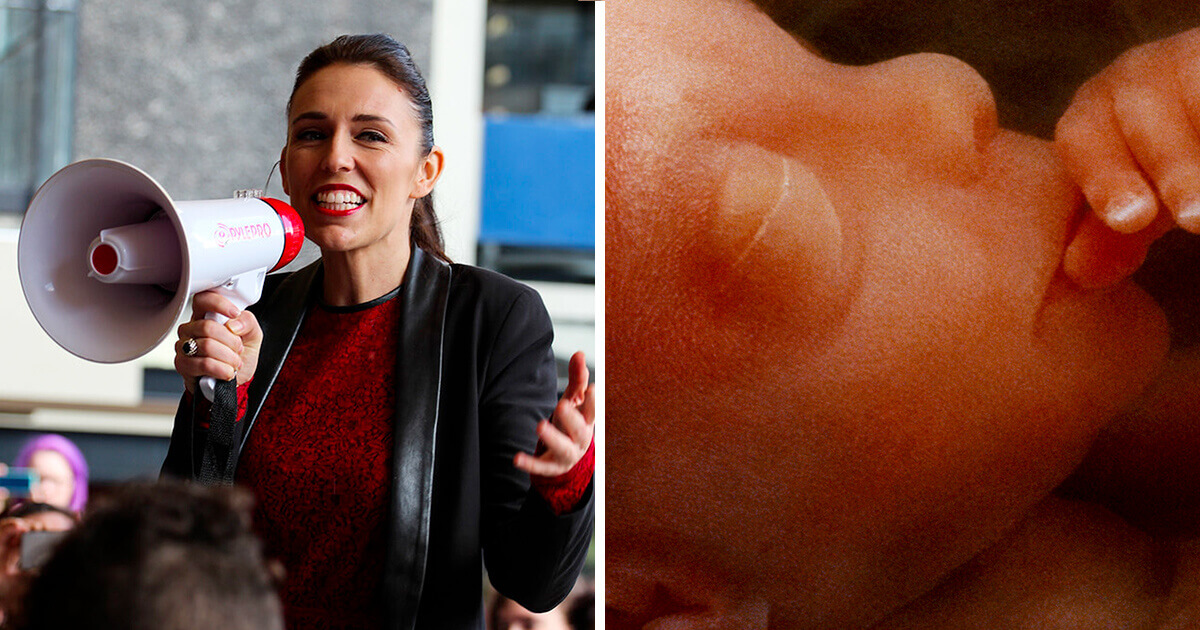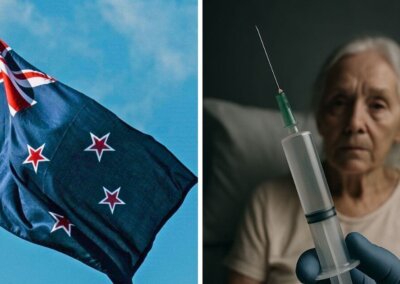New Zealand’s Prime Minister, Jacinda Ardern, has been criticised by an MP for supporting the introduction of a Bill allowing abortion de facto on-demand, for any reason, up to birth.
Responding to recent comments Ardern made that New Zealand could be doing more to improve infant mortality, Whanganui MP Harete Hipango said the “hypocrisy is astounding” given the Prime Minister supported the Abortion Legislation Bill.
In a Facebook post on Monday, Hipango stated, “This recent stance by the PM is rank and riles me as a woman who is a mother and has also advocated for children’s welfare all my professional working life as a lawyer.”
With the 2020 election just seven weeks away, Labour MP and Justice Minister Andrew Little leapt to Jacinda’s defence and said there was “no such thing as full-term abortion, people who say that are idiots.”
Andrew Little repeatedly used the same tactic when the Bill was progressing through Parliament earlier this year. Rather than admitting that the Bill did allow abortion through to birth and evidence from Victoria, Australia, where there is a similar law, shows 1,418 late-term abortions (between 20-weeks’ gestation and birth) have been performed, allowed by doctors for ‘psychosocial’ reasons with one of these occurring at 37 weeks gestation, he has continued to repeat the line that there is “no such things as full term-abortion.”
National list party MP Agnes Loheni, who was on the select committee for the abortion legislation, said the legislation “definitely” supports abortion up to birth.
“What is written in our legislation definitely supports that you could have an abortion post 20 weeks up to birth. If you look at the words yourself – there are no hoops to jump through because it is so broad and ill-defined. In my view the unborn child now is the equivalent of having an appendix removed,” she said.
She added that many MP’s who were for the bill changed their vote on the third reading because they felt uncomfortable with the “loose terms around the criteria for late term abortions”.
Hipango was also supported in her comments against the Labour Prime Minister by fellow National MP, Simon O’Connor.
In the comment section of Hipango’s Facebook post, O’Connor said the Government had “pushed through” the law ahead of the COVID-19 lockdown and that aborting a full-term baby “sure has” been legalised.
Extreme abortion regime
Earlier this year, New Zealand MPs voted to introduce the world’s most severe abortion law in the world by 68 votes to 51.
The new law scraps the previous 20-week limit and will allow terminations on-demand, for any reason, up to birth.
Additionally, there is now no requirement doctors must be involved with an abortion ‘procedure’ and MPs – including Prime Minister Jacinda Ardern – voted against an amendment requiring medical care for babies born alive after a ‘failed’ termination.
The new law has also legalised sex-selective abortion.
New proposals could deny pregnant women practical and emotional support
Four-months after introducing the extreme abortion law, a New Zealand Labour MP has introduced a Bill to make it even worse.
Labour MP Louisa Wall‘s Contraception, Sterilisation, and Abortion (Safe Areas) Amendment Bill would deny women practical and emotional support outside abortion clinics.
The proposal states this will be done through the creation of so-called “safe areas” up to 150 metres from any part of an abortion facility, with a fine of up to $1,000 for anyone deemed to be breaking the rules.
New Zealanders ignored
In light of extremely low public support and falling support from MPs, Jacinda Ardern’s Government rushed the final stages of the Abortion Bill’s progress through Parliament while politicians, the media and the rest of the country were distracted dealing with the coronavirus pandemic.
This included progressing the final sitting of the committee stage and the Bill’s third and final reading through parliament on the same day.
Polling, conducted by Curia Research revealed strong opposition to the new law by the public in New Zealand, and in particular by women.
Only 2% of women said they support abortion being available on-demand right up to birth. Meanwhile, 93% of women opposed sex-selective abortion being legal and 94% of women supported the previous legal standards for abortion providers and premises.
However, despite the extremities of the new law and little public support for the regulations, MPs voted to deny the public a final say on the legislation.
Additionally, over 40,000 New Zealanders have signed a petition urging the Government to hold a referendum giving the people of New Zealand an opportunity to repeal the extreme abortion legislation which passed earlier this year.
To put this in perspective, if New Zealand had the same population as the UK, and the same proportion of the population signed the petition this would equate to well over 500,000 signatures.
The petition’s author, Pamela McIlwraith, has said: “In my view the abortion legislation was rushed through Parliament while the entire country was distracted with COVID-19.
“I think there needs to be a referendum so the people can have their say—MPs should not be able to vote against giving the people their say in such important matters, especially a law legalising full term abortion.”
Most extreme abortion law in the world
Canada is the only country in the world that has no abortion law, as their law was struck down by a case brought to their Supreme Court in 1988.
Amongst the rest of the jurisdictions in the world that have abortion legislation, Victoria, Australia, previously had the most extreme law.
The law in Victoria allows for abortion right through to birth on physical, psychological and social grounds when approved by two doctors; this can be the abortion operating surgeon and anaesthetist.
This has, in practice, allowed for abortion on demand, for any reason, right through to birth in Victoria, Australia.
Ahead of the legislation being introduced in Victoria in 2008, abortion activists claimed that, although abortion would, in practice, be allowed for any reason, doctors would ensure that the vast majority of abortions would only occur in rare circumstances. Such cases may involve when a baby has a condition where they would either die in the womb or shortly after birth (a fatal foetal abnormality or life-limiting disability) – similar claims were made about the NZ abortion legislation by abortion campaigners and MPs in New Zealand before it became law.
Data from the 12 years of the law being in operation in Victoria, shows that this has not been the case. Right To Life UK’s Public Affairs team have undertaken an extensive analysis of published abortion data on late-term abortions in Victoria from The Consultative Council on Obstetric and Paediatric Mortality.
This data shows that since the law changed in 2008, 1,418 late-term abortions (between 20-weeks’ gestation and birth) have been performed, allowed by doctors for ‘psychosocial’ reasons – these were terminations where the baby did not have a disability and the abortion was performed on social grounds. In 2011, one of these abortions on social grounds occurred at 37 weeks.
Under the previous New Zealand law, abortion was allowed post-20 weeks on very strict grounds (when the abortion is “necessary to save the life of the woman or girl or to prevent serious permanent injury to her physical or mental health”).
This strict law has meant that abortions post 20-weeks have been rare – for example 72 abortions occurred after 20-weeks in New Zealand in 2017.
Victoria has a population that is only 32% larger than New Zealand’s, but the number of abortions that occurred post 20-weeks were much higher, 324 or 348.61% higher than the number that occurred in New Zealand that same year (published data for Victoria has not been released for 2018 yet).
Another side effect of the very high late-term abortion rate in Australia is that scores of babies have been left to die after being born alive during a number of ‘botched’ terminations.
The Victorian Consultative Council on Obstetric and Paediatric Mortality and Morbidity reported that in 2012 there were 53 ‘terminations of pregnancy’ after 20 weeks ‘resulting in live birth’.
By contrast, a 2008 report for England and Wales found that 66 infants were born alive after NHS terminations in one year. While these figures are comparable in number, Victoria’s population of 6.36 million is just a tenth of the size of the population in England and Wales.
A Channel 7 news broadcast, on April 17 2010, reported that there had been a large increase in late-term abortions being performed at the Royal Women’s Hospital since the introduction of the 2008 Abortion Law Reform. Presenter Jennifer Keyte stated how “midwives and doctors feel traumatised” by having to perform so many late-term abortions at the Royal Women’s Hospital. Journalist Louise Milligan said that there had been some ‘alarming requests’ for late-term abortions, including a request for a termination at 32 weeks because the baby had a cleft lip.
The new abortion law in New Zealand is even more extreme than the law in Victoria, Australia – making it the most extreme abortion law in the world.It allows abortions between 20-weeks’ gestation and birth with the go-ahead from just two health practitioners (this could include nurses and midwives) rather than the higher threshold of two doctors that are required in Victoria.While the legislation in New Zealand was progressing through parliament, the Abortion Legislation Committee widened the, already loose, criteria to include “overall well-being” – making it even easier for abortions to happen between 20 weeks and birth in New Zealand. These are undefined terms and it will be up to the healthcare practitioner involved as to how they interpret them.












